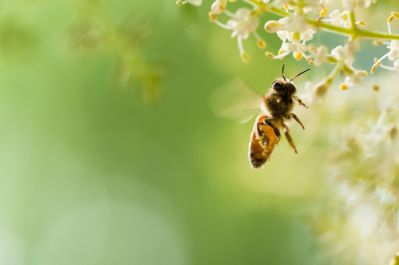 Insects are considered pests in most homes in the United States. If you have termites, roaches or spiders, you may have called your local pest control to get rid of those bugs. The authors of the Bible used insects to tell stories and describe behavior. Take the ant. The writer of Proverbs compares the work of an ant against that of a “sluggard.” The ant stores up food and gathers a harvest without a ruler or overseer. Here are some of the insects mentioned in the Bible.
Insects are considered pests in most homes in the United States. If you have termites, roaches or spiders, you may have called your local pest control to get rid of those bugs. The authors of the Bible used insects to tell stories and describe behavior. Take the ant. The writer of Proverbs compares the work of an ant against that of a “sluggard.” The ant stores up food and gathers a harvest without a ruler or overseer. Here are some of the insects mentioned in the Bible.
The Honeybee
Honey is mentioned over 60 times in the Bible. Honeycomb is compared to pleasant words in Proverbs 16:24. In Genesis, honey is used as an honored gift. John the Baptist ate locusts and honey. The insect that makes honey, the bee, isn’t mentioned as much. Samson found a swarm of bees in the carcass of the lion he tore apart before his wedding. He used the image of honey inside the bones as a riddle to tease his bridegrooms. In scripture, bees are usually described as chasing someone.
Crickets and Locusts
Crickets and locusts are annoying, not for a bite but for the noise they make. They’re both mentioned in Deuteronomy 28, a chapter about being cursed for disobedience. Locusts were one of the 10 plagues brought upon Egypt before the Israelites were freed. Joel prophesied that armies of locusts were coming to destroy the country. Some commentators believe that this was a reference to the destruction of Israel by a foreign enemy, not literal locusts. It was to remind the Israelites that they needed to repent and turn back to God.
Spiders and Spider’s Webs
In Isaiah 59:5, the wicked are said to weave a spider’s web, which is vain and useless. In many traditions, a spider’s web reminds us to be conscious of our choices as we “weave our life.” Biblically, a spider’s web is compared to a hypocrite’s trust. The spider’s web is considered frail and weak.
Maggots
Maggots are associated with decay in the Bible. In the Book of Jonah, Jonah is protected from the sun by a plant that is destroyed by a worm, or maggot. Jonah wanted to die from the heat and wind once he wasn’t protected by the plant. God makes the point that Jonah did nothing to tend the plant. It grew overnight and died overnight. Worms are also referred to at Herod’s death in Acts 12. King Herod was struck down by an angel of the Lord and eaten by worms.
The most famous reference to maggots is probably found in Job 25:6, “How much less a mortal, who is but a maggot—a human being, who is only a worm!” Bildad, one of Job’s advisors, is speaking of how man cannot be justified before God. The scripture implies that man is corrupt, weak and groveling.
Leeches
Leeches are often referred to as “bloodsucking parasites.” At one time, they were used medicinally as a healing therapy, but there is little to support their powers. Proverbs 30:15 mentions the leech: “The leech has two daughters: Give and Give. Three things are never satisfied; four never say, “Enough.” Being called a leech is not a compliment. The author of Proverbs is giving readers a twofold warning. Beware of leeches, and don’t be a leech.
Gnats
The bane of picnics, gnats are an incredibly annoying pest that are extremely tiny. In the gospel of Matthew, the Pharisees are called hypocrites that “strain out a gnat but swallow a camel.” That means the Pharisees are looking for small infractions of the law while neglecting the bigger things, such as justice and mercy. Gnats were also one of the 10 plagues on Egypt.
Learn More About Bible Culture
Next time you’re annoyed by an insect, consider that it is part of creation. You don’t have to share your home with bugs, but you should appreciate what they represent in the food chain.



